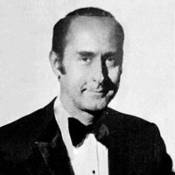
By RCA Records - Public Domain
Henry Mancini
Composer
Biography
Henry Mancini
Born Enrico Nicola Mancini to Italian immigrant parents, Henry Mancini grew up in the Little Italy neighborhood of Cleveland, Ohio. As a child, he began to learn the piccolo, and later gained renown as a flautist. While still in school, Mancini learned piano and studied music theory, orchestration, and arrangement.
When he turned 18 in 1943, Mancini enlisted in the United States Army. He was sent overseas to Europe. In 1945, Mancini was in the forces that liberated the Mauthausen-Gusen concentration camp in Austria.
When he was discharged in 1945, Mancini returned to his musical skills. He joined the Glenn Miller Orchestra as a pianist and composer. Following this tenure, he was hired as a musician by Universal-International (now known as Universal Pictures) in 1952. He contributed to numerous movie scores before becoming an independent composer and arranger in 1958.
Mancini's biggest break came with the 1961 film Breakfast at Tiffany's. He won the Academy Award for Best Score, as well as the Academy Award for Best Song for "Moon River." He followed this success with Days of Wine and Roses, awarded the Academy Award for Best Song for the film's title song.
In 1982, Mancini composed the score for the film Victor/Victoria--again winning an Academy Award for Best Score. In 1995 (after Mancini's death), the film musical was adapted to Broadway, again starring Julie Andrews in the title role, with additional music and arrangements by Frank Wildhorn. All together, Mancini was nominated for 72 Grammy Awards (won 20) and 18 Academy Awards (won 4). He was nominated for two Emmy Awards and won a Golden Globe.
Henry Mancini's musical legacy is heard in some of the most popular musical themes of the 20th century--the theme to The Pink Panther and Peter Gunn, to name only a few. He also established musical scholarships, and programs and foundations were established after his death in 1994.
Known For
Shows
Shows associated with Henry Mancini
Videos
Videos associated with Henry Mancini
Additional Information
N/A